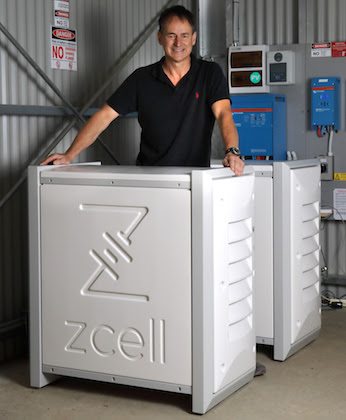
An off-grid property in South Australia has been revealed as the site of the first “completed customer deployment” of the ZCell – the residential battery storage offering from Brisbane-based company Redflow.
Redflow said on Tuesday that the off-grid solution, comprising a 6kW rooftop solar array and two ZCell batteries totalling 20kWh of storage capacity, had been installed at a 100-hectare Willunga property owned by Alan Noble – the engineering director for Google Australia and New Zealand.

Noble said that the hilly property had access to mains power in only one corner, and so extending mains power further was projected to be substantially more expensive and less flexible than the off-grid solar and battery storage solution.
“We wanted the flexibility to build anywhere on the site without having overhead power lines,” he said. “Secondly, we have power when we need it. If there is a bushfire here, we can power our pumps properly whereas electricity distributor SA Power Networks has a policy of actually shedding power during high bushfire risk days, so precisely when you need the power, they shut it down.
“Without the ZCells, we’d be running around trying to fire up generators during hot days, which is not practical.”
Noble said the batteries, which are integrated with 12 Tindo Solar panels installed on the roof of a large shed and two Victron battery inverters by ZCell installer Off-Grid Energy Australia, had continued working uninterrupted during the recent storm-caused power failure that blacked out the rest of South Australia.

“We want to make this property as automated as possible,” he added. “I want it so we can move water automatically, based on the power to turn on pumps, to turn on sprinklers and turn on any fire defences. We can only do that if we have our own on-site power.
“Last, but not least, I really like the idea of being self-sufficient. The way I see it, grid power is getting more and more expensive, so this is an investment that in the long term is going to be worth it.”
Noble said he chose Redflow’s zinc-bromine flow batteries rather than lithium-based alternatives for their ability to function safely in a high heat environment.
“It does get hot here in the summer as the shed is not air-conditioned. Also, getting back to the earlier point about having power when you need it most, on really hot, high risk bushfire days, I want to make sure my batteries are working on those extreme heat days.”
Another benefit of the ZCell chemistry, he said, was their durability and long shelf-life, even if they weren’t being regularly cycled.
“Conventional batteries don’t like being fully discharged. Longer term, that’s less of an issue, but over the next couple of years while we’re not living here full-time, it’s nice to know that I’m not going to destroy the batteries if they’re fully discharged. They’re also relatively compact batteries too, so they don’t take a lot of space.
“Also, ease of use is a nice factor with ZCell,” Noble said. “It’s all very easily managed through the BMS (Battery Management System), both onsite and through the Internet. I’m looking forward to setting up my rules and have everything automated so it’s just working quite happily.
Redflow CEO Simon Hackett said he was delighted to see the first two ZCell batteries installed and operating successfully in the field.
“We have worked very hard to reach this point,” he said. “We look forward to seeing many more ZCell-based residential and commercial energy system installations deployed around Australia and, ultimately, around the world.”

Sophie is editor of One Step Off The Grid and editor of its sister site, Renew Economy. Sophie has been writing about clean energy for more than a decade.
